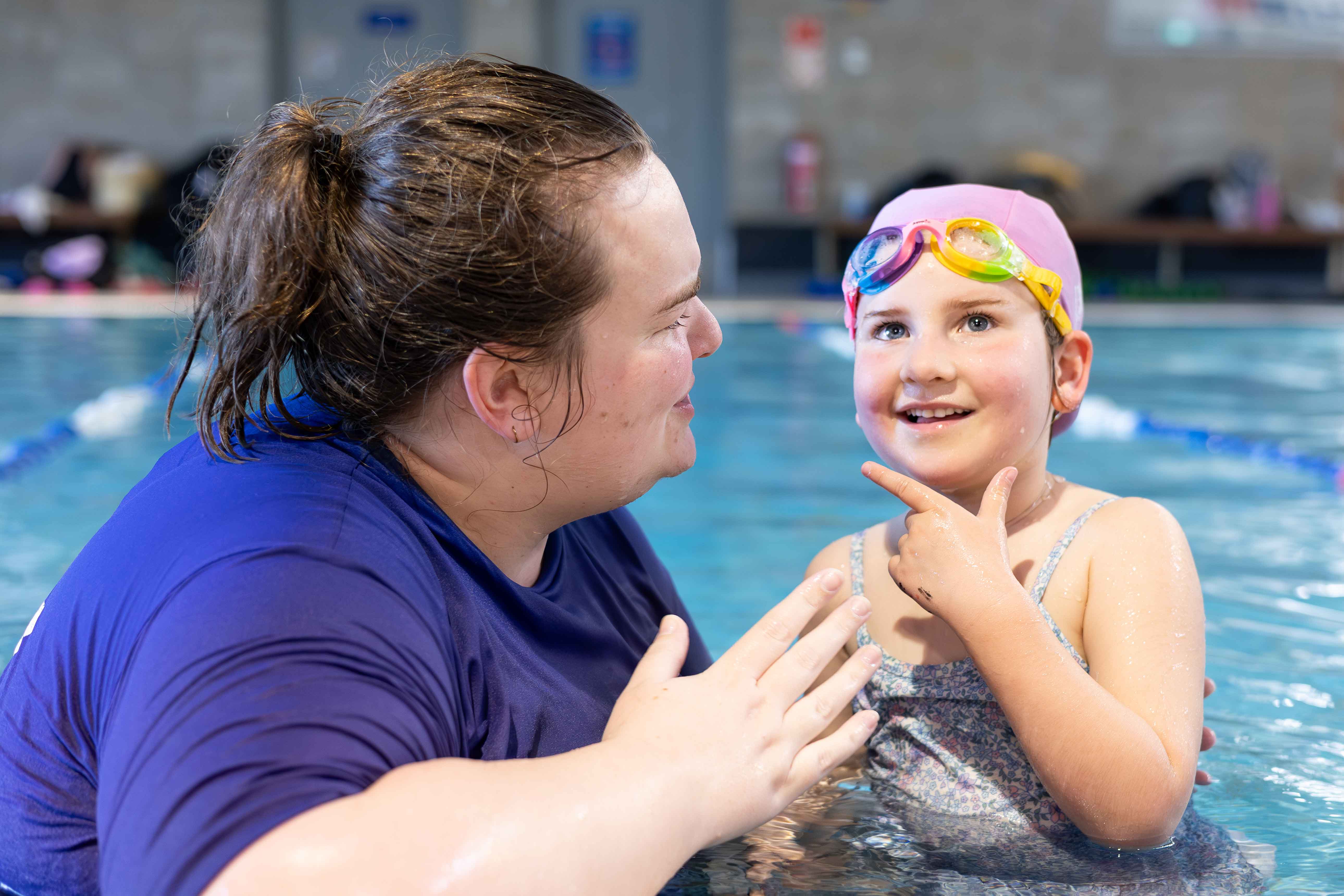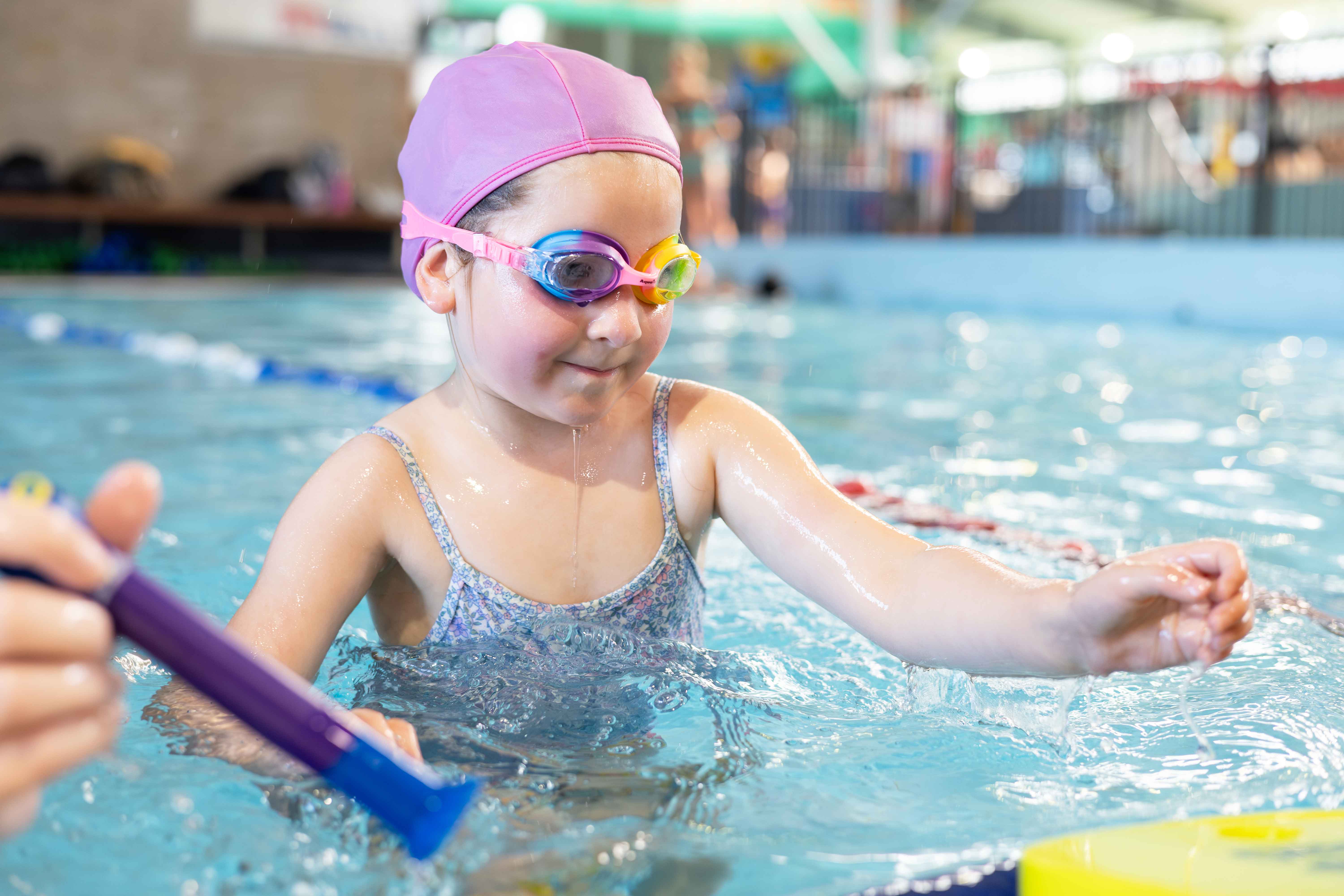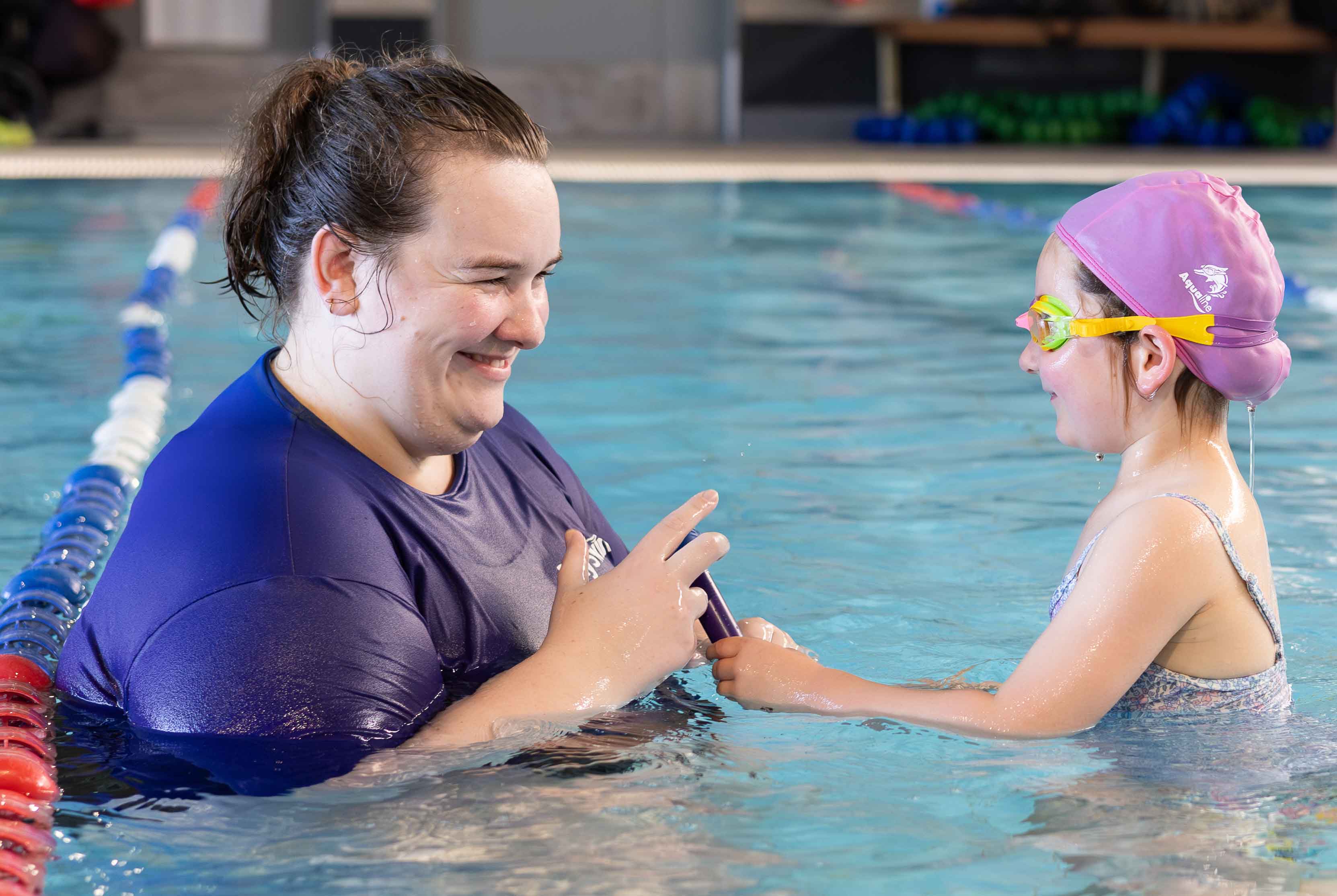In the learner pool at Baywave, in a quiet lane to the left, Emily McCall’s eyes are locked on her swim teacher. Find out why this pair shares a special partnership in the pool.

It’s a Sunday afternoon and Baywave is buzzing. On one side of the busy aquatic centre, kids are bobbing happily in the wave pool and racing down the hydroslide.
In the learner pool, in a quiet lane to the left, Emily McCall’s eyes are locked on her swim teacher. She is completely focused.
The five-year-old “little mermaid” dives under the water and then pops back up to the surface, watching intently for her next instruction, which is delivered in sign language.
Emily smiles and signs back. This is their own special way of communicating in the pool.
Emily was born with progressive hearing loss. She has a cochlear implant in her right ear and wears a hearing aid in her left. When she takes them off to swim, it means she cannot hear her teacher.
So, they use sign language in the pool instead. Emily is brave and determined to succeed. She’s tenacious. She splashes about freely in the water, having fun, learning, clearly not only comfortable but confident.
“The pool is her happy place,” says mum Sonya McCall, who is sitting poolside. “She just loves to swim. It’s one of her favourite things to do.”
Emily was the first student to sign up for BaySwim’s new sign-supported swimming lessons, which began in August. Her lessons are held every Sunday afternoon at Baywave Aquatic & Leisure Centre in Mount Maunganui. The best part is she gets to learn alongside her brother – side-by-side in adjacent lanes, in the same pool, at the same time. It’s just that Emily’s lessons are a little different.

The sign-supported swimming lessons are the brainchild of senior swim teacher Heidi Dixon, who wanted to be able to teach deaf and hard-of-hearing children how to swim safely and independently.
“If people don’t know how to swim or are really nervous around the water, it cuts off so many activity opportunities. Their trips to the beach would be full of fear.”
Heidi says learning to swim is a “vital” life skill for anyone living in New Zealand, and the student and teacher need to be able to understand each other in the pool when going on that journey together.
A little over two years ago, Heidi started learning sign language. Now, she has her first student.
“It is an honour that Emily is able to communicate with me and to feel like she can,” Heidi says.
“She can talk out loud, and she does when she isn’t signing, but for her to communicate in her own language is special.”
Heidi is keen to have more young swimmers like Emily enrolled in the sign-supported classes.
Heidi can do private or group lessons, at either Baywave or Greerton Aquatic & Leisure Centre, and she is flexible with days and times. “I want them to feel welcome in this environment and to feel like they can learn to swim safely and without judgement.”
Sonya says deaf children are naturally gifted at following along – “they are often so good at copying; they are so visual”. However, that can sometimes also mean they appear like they understand but are not, in fact, reaching their full learning potential.
So, knowing that Heidi has a full understanding of Emily’s hearing levels, and knowing that she can communicate more visually with her, has given everyone involved more confidence.
“I can see she is responding more clearly to what Heidi is saying,” Sonya says, as she gives a thumbs up to a smiling Emily who has just kicked past on her back without support for the first time.

Sonya says you don’t even need to know sign language to benefit from Heidi’s visual teaching methods.
“There will be lots of people out there who wear hearing aids and don’t know any sign language. It’s providing access they perhaps wouldn’t have otherwise.”
Emily and her family are still learning the language.
“We are not fluent in sign language by any means. But we are all learning, so Emily is learning as fast as we are,” Sonya says.
Emily’s family was introduced to New Zealand Sign Language (NZSL) through Deaf Aotearoa’s First Signs service. Emily’s dad Dion finds NZSL helpful in communicating with Emily both at home and out in a crowd. Sonya has advanced her NZSL further, having done night classes at Merge NZ. Emily’s grandparents are also learning, and so is Emily’s proud seven-year-old big brother, Sean.
“He took to it like a duck to water,” Sonya says. “He’s awesome. At Sign Language Week this year, he taught his class the alphabet. Sometimes, if he’s really tired and doesn’t want to talk, he will sign to me.”
Sonya is now also on the volunteer-run Bay of Plenty Association for Deaf Children committee, which facilitates peer support for children with any level of hearing loss and their families, and says she hopes BaySwim’s new sign-supported swimming lessons will continue to grow, giving more deaf and hard-of-hearing children the opportunity to build confidence in the water.
“We are surrounded by water. We want these kids to have equal access and opportunity to learn to swim. To grow confidence, and practise signing in the real world,” Sonya says.
“Emily is always asking for other kids to join her class. We are so grateful to Heidi and BaySwim for getting this off the ground,” she says.
“It is just totally normalising it. She is doing what a five-year-old girl should be able to go and do.”
BaySwim
BaySwim teaches people of all ages and abilities, from babies and children all the way up to adults, offering both private and group lessons.
The new sign-supported swimming lessons is the latest initiative aimed at reaching members of the Tauranga community who would otherwise find it difficult to get into a pool and learn to swim.
BaySwim has specialist lessons and programmes for people with sensory sensitivities, for children living in foster care, and for the transgender community.
There are also dedicated culturally appropriate swimming classes for ethnic women, swimming lessons for our Korean and Chinese communities in their own language, and a “teach the teacher” programme that empowers kaiako to deliver swimming lessons to their own ākonga in te reo Māori.
To register for any of these initiatives, please email bayswim@bayvenues.co.nz or visit www.bayswim.co.nz
+ MORE FROM BAY VENUES